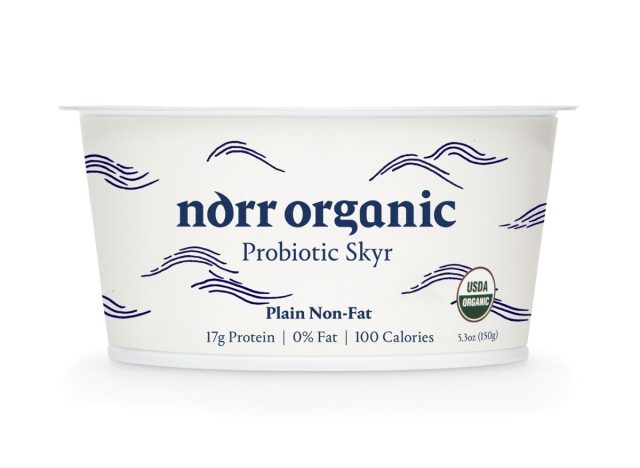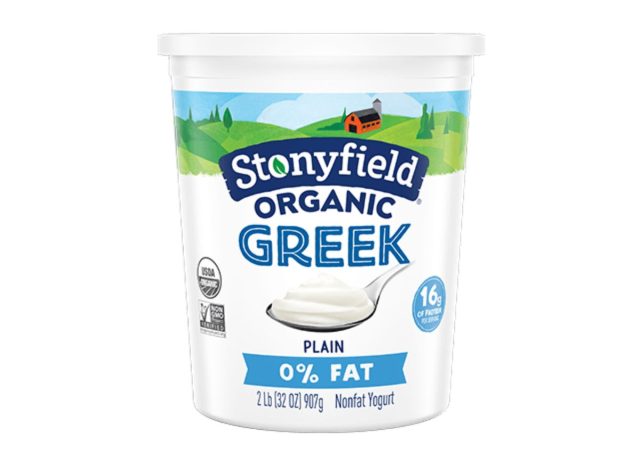Yogurt can be a part of your diet if you’re watching your cholesterol, but it depends on the types that you eat. If cholesterol management—particularly lowering your cholesterol—is your main concern, you need to make sure you select the right kind of yogurt before adding it to your shopping cart.
Although your body needs cholesterol to build healthy cells, if it’s too high, you may run an increased risk of heart disease and other health issues. Having high cholesterol means you’re more susceptible to the growth of fatty deposits in your blood vessels, which could lead to difficulty for blood flow through your arteries, according to the Mayo Clinic. If you’re at risk, you need to be careful about the types and quality of food you put into your body. Some might be more harmful, while others can actually benefit your health.
But what are the right kinds of yogurt to help you maintain and possibly lower your cholesterol? According to the Nutrition Twins Lyssie Lakatos, RDN, CDN, CFT, and Tammy Lakatos Shames, RDN, CDN, CFT, the best yogurt to help lower or regulate cholesterol levels are nonfat, probiotic-rich yogurts that are low in sugar and have higher protein.
Why is this yogurt better for cholesterol management?


“Although saturated fat has been a bit more controversial in recent years, and genetics may play a part, slashing saturated fat [in yogurt] is important when it comes to heart health. This is because when you get too much, it tends to raise ‘bad’ LDL cholesterol,” says the Nutrition Twins. “Also, it’s important that the yogurt is low in sugar because when you eat too much sugar, your liver makes more LDL cholesterol while lowering the amount of HD ‘good’ cholesterol in your body.”
The Nutrition Twins also claim that sugar increases inflammation, making cholesterol more dangerous. This is because it plays an essential role in atherosclerosis, or the hardening of the arteries that occurs as LDL cholesterol builds up.
When it comes to choosing the correct yogurt, the Nutrition Twins advise selecting those with low or very little saturated fat, as these are best for managing cholesterol in much of the population. However, they also note that it’s just as important to find yogurts with little to no added sugars. Greek yogurt and the Icelandic yogurt skyr fit this bill well because many of them contain probiotics, don’t have saturated fats, are low in sugar, and are high in protein.
“For an individual who has a diet that is very low in saturated fat and that includes no added sugar, a yogurt that contains these components likely would not affect them negatively,” says the Nutrition Twins. “However, in our modern-day world, the majority of people don’t have diets like that.”
Paying attention to the probiotics as well as additives should also factor into selecting the best yogurt for your cholesterol.
“Good gut health plays a major role in overall cholesterol management,” explains the Nutrition Twins. “Gut bacteria, which are impacted and improved by probiotics, have a large impact on overall health. [It also] seems to regulate immune health and metabolic pathways, and a healthy balance of gut bacteria has been shown to reduce cholesterol in the blood in animals.”
They also claim that eating more fermented foods like yogurt can increase microbial diversity, which plays a critical role in overall gut health and healthy cholesterol levels.
What should you look out for on yogurt labels?


When deciding on what yogurt to pick with respect to the possible effects on your cholesterol, it’s important to look at the label. For instance, many yogurt brands contain helpful probiotics. And according to the Nutrition Twins, “Research has shown that certain probiotics can reduce both total cholesterol and ‘bad’ LDL cholesterol.”
While most yogurt ingredient lists may not break down the amount of each specific probiotic strain, they do typically note the types of probiotics within them.
“Lactobacillus tends to be best in general,” says the Nutrition Twins say. “Both Lactobacillus probiotics L. plantarum and L. reuteri have been found to be effective in reducing cholesterol levels.”
READ RELATED: Here's How Many People Actually Have "Long COVID"
Also, any yogurt that is fat-free will not contain saturated fats capable of raising LDL levels, and has no or low amounts of sugar is ideal for managing cholesterol levels.
What are the best yogurt brands to lower cholesterol?
While many yogurt brands out there may offer products that can contribute to healthy cholesterol management, the Nutrition Twins suggested their top picks for those they deem best when being mindful of your cholesterol.
“We chose [yogurts] with no added sugar or minimal amounts of added sugar for flavored varieties,” the Nutrition Twins explain. “We also chose brands that lack additives and some that eliminate pesticides—as all can increase inflammation that damages the body and is linked to chronic disease, including heart disease.”
1. Norr Organic


Norr Organic products come from small family farms where cows have plenty of pasture as well as fresh air. Its yogurt products are also free from pesticides, GMOs, hormones, or antibiotics, which the Nutrition Twins suggest can help minimize the likelihood of inflammation. In addition, these organic yogurts contains specific probiotics that support your immune system and gut health.
“This brand also contains the probiotics Bifidobacterium anim. s. lactis BB-12® (BB-12®), with benefits related to gastrointestinal health and immune function,” the Nutrition Twins continue. “Research has shown that specific probiotic strain can improve cholesterol levels.”
Of all the yogurts that Norr Organic offers, the Nutrition Twins recommend plain, nonfat Norr Organic Probiotic Skyr yogurt. At only 100 calories, it has no added sugar and is packed with protein. More strained than Greek yogurt, Icelandic skyr yogurt is typically higher in protein compared to other yogurts, and the Norr Organic Probiotic Skyr yogurt, in particular, has 17 grams of protein.
“If you want a flavored version, go for [Norr’s] nonfat varieties that have 100 calories, 15 grams of protein, and 11 grams of sugar, which saves you a good deal of sugar compared to most flavored varieties that contain at least 20 grams of sugar,” says the Nutrition Twins.
2. Siggi’s


When it comes to cholesterol management, Siggi’s yogurt contains simple ingredients and probiotics with not a lot of sugar. They don’t use artificial sweeteners, and the milk they use comes from family farms that don’t use growth hormones, such as rBST.
For cholesterol management, the Nutrition Twins recommend enjoying Siggi’s Simple Ingredient Skyr yogurts, particularly the nonfat flavored options or the low-sugar, lower calorie choices—which also happens to contain the probiotic Lactobacillus acidophilus.
“If you’re looking for a flavored option, Siggi’s nonfat flavors keep the sugar low at 8–11 grams of sugar per serving, and it includes the fruit that it is partially sweetened with,” says The Nutrition Twins. “[It also has] 15–16 grams of protein in 120 calories.”
As for the low-sugar, lower-calorie skyr yogurt, the Nutrition Twins point out that this version has 14 grams of protein in addition to only 2 grams of sugar, having no artificial sweeteners, and being only 100 calories.
“While it does contain 1.5 grams of saturated fat, it’s just a fraction of the maximum of 20 grams of saturated fat recommended daily,” the Nutrition Twins explain. “[But it] is a good tradeoff for being low in sugar, especially considering all the other benefits that come with it.”
3. Stonyfield


Yogurt from Stonyfield meets organic standards—meaning they’re free of pesticides—and some include the probiotics S. thermophilus, L. bulgaricus, L. acidophilus, Bifidus, and L. paracasei.
“Our pick of yogurt for this brand would be the Stonyfield 0% Fat Greek Plain,” says the Nutrition Twins. “It’s simple, nonfat, [and] free of added sugars and gums and additives. Just probiotic-rich and saturated fat-free, this yogurt provides 16 grams of protein in 100 calories.”
To also play it safe when choosing the best yogurt with consideration to your cholesterol levels, the Nutrition Twins suggest selecting nondairy options. “These are a safe bet if they don’t contain a lot of sugar.”
Source:









